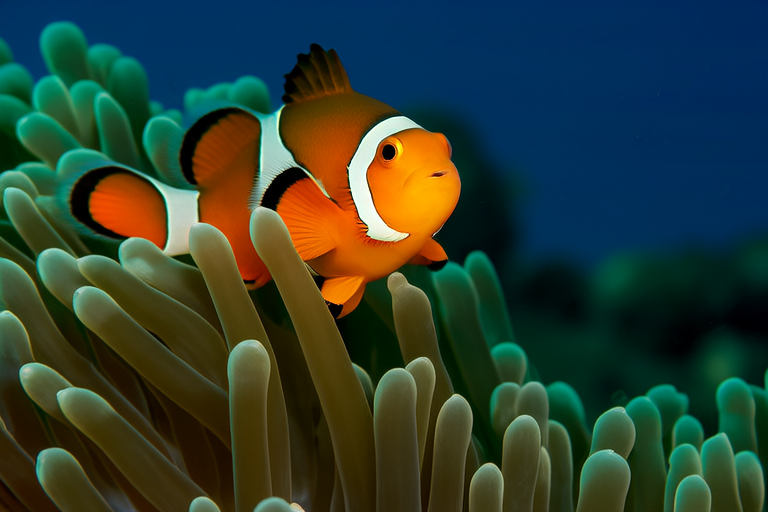The Ultimate Guide to Keeping Your Clownfish Happy and Healthy
Clownfish are among the most popular saltwater aquarium fish due to their vibrant colors, fascinating behaviors, and the iconic symbiotic relationship with sea anemones. This guide provides a comprehensive overview of clownfish care, including tank setup, water parameters, diet, compatible tank mates, common diseases, and preventive measures.
Tank Setup
Creating an ideal environment for your clownfish requires careful planning and attention to detail. A minimum tank size of 30 gallons is recommended for a single clownfish, while a 55-gallon tank is suitable for a mated pair. Clownfish prefer a well-planted tank with plenty of hiding spots and open swimming areas. Incorporate live rock, corals, and anemones (if desired) to mimic their natural habitat.

Lighting and Filtration
Use high-quality LED lighting that mimics natural sunlight cycles. Ensure adequate filtration to maintain water quality, as clownfish produce waste like any other aquatic creature. A protein skimmer can be beneficial in larger tanks, removing dissolved organic compounds before they break down into harmful substances.
Water Parameters
Maintaining stable water conditions is crucial for clownfish health. Ideal parameters include:
- Temperature: 76°F – 82°F (24°C – 28°C)
- pH: 8.1 – 8.4
- Specific Gravity: 1.020 – 1.025
- Ammmonia: 0 ppm
- Nitrite: 0 ppm
- Nitrate: Below 20 ppm
Regular water testing and partial water changes (20% every two weeks) help keep these parameters within acceptable ranges.
Diet
Clownfish are omnivores, consuming both plant matter and small animals. Offer a varied diet consisting of:
- Frozen foods: Mysis shrimp, brine shrimp, and bloodworms
- Dried foods: High-quality flake food, pellets, and freeze-dried krill
- Live foods: Small feeder fish and ghost shrimp
Feed your clownfish twice daily, providing only what they can consume within 2-3 minutes. Overfeeding can lead to poor water quality and obesity.
Compatible Tank Mates
Selecting appropriate tank mates ensures harmony and reduces stress for your clownfish. Compatible species include:
- Other peaceful marine fish, such as damsels and tangs
- Invertebrates, like hermit crabs and starfish
- Non-aggressive coral species
Avoid aggressive or territorial fish, such as triggerfish and lionfish, which may bully or prey upon clownfish. Additionally, ensure that potential tank mates share similar water parameter requirements.
Common Diseases and Preventive Measures
Like all aquatic creatures, clownfish are susceptible to various health issues. Early detection and prompt treatment are key to recovery. Common ailments include:
Ich (White Spot Disease)
Characterized by white spots on the body, fins, and gills, ich is caused by protozoan parasites. Maintain proper water quality and quarantine new additions to prevent outbreaks. Treat affected fish with copper-based medications.
Bacterial Infections
Symptoms include redness, ulcers, and lethargy. Strengthen the immune system through proper nutrition and avoid overcrowding. Administer antibiotics under veterinary supervision if necessary.
Fungal Infections
Recognizable by cotton-like growths on the skin or fins, fungal infections often occur in stressed or injured fish. Improve water quality and treat with antifungal medications.
Expert Advice and Practical Tips
For beginners:
- Start with a smaller tank to familiarize yourself with maintenance tasks.
- Invest in reliable test kits and monitoring equipment.
- Join local aquarium clubs or online forums for support and advice.
For experienced aquarists:
- Experiment with different tank setups and decorations to observe clownfish behavior.
- Consider breeding programs to contribute to conservation efforts.
- Stay updated on the latest research and advancements in marine biology.
Remember, a healthy clownfish exhibits vibrant coloration, active swimming, and regular feeding behavior. Monitor your fish closely and respond promptly to any signs of distress.
Conclusion
Providing optimal living conditions for your clownfish involves understanding their specific needs and adapting your aquarium accordingly. By following the guidelines outlined in this ultimate guide, you can ensure your clownfish thrive in their new home. Remember, a happy and healthy clownfish contributes significantly to the overall beauty and vitality of your marine aquarium.
